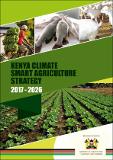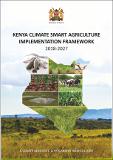Policy Brief No. 07 of 2022-2023 on Supporting Youth Involvement in Climate Smart Agriculture
Publication Date
2022Author
Type
KIPPRA Publicationsviews
downloads
Metadata
Show full item recordBy
Makau, L.; Hurdsone, T.; Mogaka, B.; Kiptoo, E.; Musili, B.,
Abstract/
Youth participation in agriculture has been declining over the years in Kenya. Youth labour force in agriculture in 1995 was 60.72%. Twenty-five years later, it has declined to 28.47% in 2020.1 Despite agriculture being central to addressing youth unemployment, the youth are increasingly turning away from agriculture to seek for what they believe to be profitable and business-focused careers. This decline in youth participation is a major concern because the youth can be a resource in agriculture by replacing the aging farmers in the sector.2 Some of the factors that have contributed to the decline in their participation in agriculture include minimal to no access to data and information on climatesmart agriculture (CSA), negative attitude towards agriculture, limited access to land, inadequate climatesmart technological capacity and knowledge to apply technology appropriately in CSA, and financial constraints. Poor coordination among institutions mandated with implementation of policies and programmes in agriculture are other impediments for participation of the youth in climate-smart agriculture. Therefore, tapping the youth potential is critical for climate-smart agriculture, which is a transformative approach to agricultural production. The youth are a potential driving force of climate-smart agriculture due to their innovativeness and energy.
Subject/
Youth Involvement; Smart Agriculture; Climate-smart Agriculture; Agriculture Initiatives; Technological Advancements
Publisher
The Kenya Institute for Public Policy Research and Analysis (KIPPRA)Series
PB/07/2022-2023Collections
- Policy Briefs [161]
Related items
Showing items related by title, author, creator and subject.
-
Kenya Climate Smart Agriculture Strategy 2017-2026
Ministry of Agriculture (Ministry of Agriculture, 2017)Climate change is real and has become an impediment to sustainable development globally. Climate change will have a range of positive and negative impacts in agriculture depending on the regions of the world. The negative ... -
Kenya Climate Smart Agriculture Implementation Framework 2018-2027
Ministry of Agriculture (Ministry of Agriculture, 2018)The Agriculture Sector is the backbone of Kenya’s economy, contributing 25% of National Gross Domestic Product (GDP) directly and another 27% indirectly. Kenya’s agriculture is mainly rain-fed (98%) and predominantly ... -
Discussion Paper No. 342 of 2024 on Review of Policy and Legal Framework for Smart and Sustainable Cities in Kenya
Njogu, Humphrey; Kaibungá, Betty; Bulimwa, Victor; Kesane, Abdirazak & Ondari, Derrick (The Kenya Institute for Public Policy Research and Analysis (KIPPRA), 2024)Cities across the world are facing unprecedented difficulties in terms of sustainability, efficiency, and quality of life as urbanization continues to increase. Utilizing technology and data-driven solutions, popularly ...




